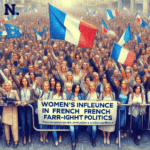In a few months, there can be two main themes that will define foreign exchange markets: political uncertainty in Europe, especially in France, and a change from the United States in terms of economic policies. Analysts will keenly watch these global currencies, as they are going to play a big role.
The first, and possibly most volatile, investment factor is France, where an RN party may come into power under Marine Le Pen. Chris Turner, ING’s global head of markets, mentioned this political uncertainty and its probable impact on the euro. With France going to the polls on June 30th and July 7th, investors are preparing for EUR/USD volatility, albeit with a cautious downside bias, as they look to reduce euro exposure ahead of the elections.
Political Uncertainty in Europe
It is against this backdrop of uncertainties that investors have increasingly resorted to safe-haven betting in the EUR/CHF pair. EUR/CHF characterized to be a better option at the prevailing levels around 0.9500, relative to the full-blown political risk coming out of France. To most analysts, this pair makes the best bet toward shielding from potential market turbulence emerging from the French elections due to its stability factor.
Additionally, the US economic background is playing a role in influencing the FX market dynamics. Indeed, the hints of disinflation in the US strengthened further the view that the Federal Reserve eventually sets the course for a rate cut probably in September. The shift in monetary policy stance is likely to affect currency pairs with USD as one of the legs, influencing further volatility and causing strategic decisions for both investors and traders alike.
On the other side of the Atlantic, it’s not that the United Kingdom is having things very smooth either. Considering its own economic issues, given UK May CPI figures are expected to show lower inflation, some are operating based on calculations that the Bank of England would do the same with rate cuts as early as August. Such a situation could put some downward pressure on the British pound, possibly forcing the EUR/GBP back above the 0.85 threshold once again.
Political Stability and Commodity Currencies
Attention will turn to commodity currencies in the G10 space, as markets look beyond Europe and the UK. The Australian dollar, for example, could outperform, with its economy led by a central bank that appears in a better position to resist joining the global trend to cut rates. That is because of its relative immunity from any imminent changes in monetary policy, thereby putting currencies like the Australian dollar in a favorable position against the backdrop of broader market volatility.
The best description of the market sense toward these currencies can be cautious optimism, tempered by geopolitical uncertainty and monetary policy evolution. It is in these crosswinds that investors have hedged via EUR/CHF or biased commodity linkages.
Conclusion: Impact of French Elections
Only in the coming months, the Forex market is heading into a political turning point, driven by events in Europe, mainly in France, and changing economic policies, especially of the US and the UK. The uncertainty that the French elections have caused for the euro and other European currencies opens the window to volatility, while the change toward rate cuts in the US and the UK might bear on the dollar and the pound. Currencies that are perceived as safer havens or have less exposure to immediate rate adjustments will become increasingly attractive to investors. These could include currencies such as the Swiss franc and resilient commodity-linked currencies. In such an environment, investors should practice prudent risk management. They should stay alert, adapt their strategy as events unfold, and seize opportunities from potential market fluctuations.





